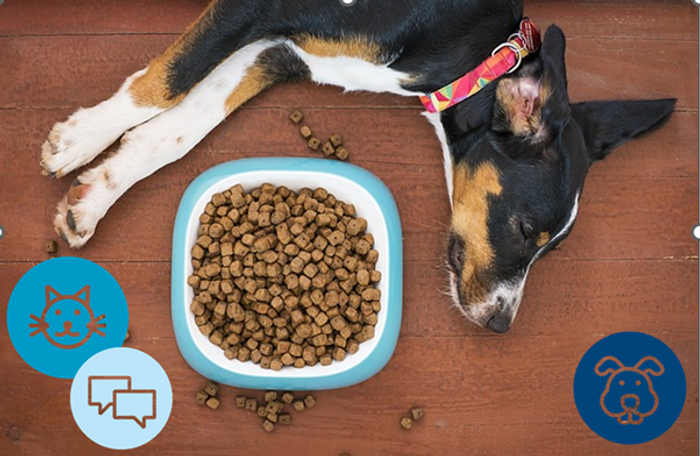
Remember the 90s? Boybands and the Spice Girls reigned supreme, Beanie Babies could be found in every nook and cranny and… all the dog poo on the pavement was white. OK, maybe that last one is a bit niche – but you remember it, right? RIGHT?
From the 1970s to the 1990s, the “white dog poo” phenomenon was apparently due to the make-up of dog food, which included huge amounts of bone meal. Now recipes have changed times and white dog poo is a thing of the past, sunken within the passage of time, lost to the wind... *sniff*.
The pet food industry obviously has come on leaps and bounds since those times; now companies offer vegetables, raw meat diets, environmentally friendly feeds etc. And with those changes comes a shift in advertising – marketers are more likely to depict cats, dogs and other furry friends as “part of the family” and deserve to be treated as such, and also much more likely to appeal to (potentially eco-conscious) consumers who care about what they are feeding their pets.
So, what are the marketing ‘Do’s and Don’t’s’ for pet food? Read on to see two of our latest pet food rulings, and how you can avoid being in the doghouse with your marketing. Dinner is served - bone appétit!
Carbon Pawprint
Our first ruling deals with plant-based and environmental claims. It consisted of two Facebook posts, one of which stated, “… Vets have confirmed that 51% of dogs in the UK are overweight…Research found overweight dogs' lifespan can decrease by 20%. …The solution? A healthier plant based alternative our pooch will love!” and the other stating “JOIN THE PACK FOR A HEALTHIER DOG & PLANET”. …Better for The Planet”. A complaint was received that challenged whether the environmental claims were accurate, and whether plant-based diets for dogs were healthier than a meat-based one.
When defending the claim that plant-based diets were “healthier”, the advertisers provided the ASA with three studies. However, the ASA found that all studies were inconclusive, with some suffering from potential bias and others lacking a control group. For the environmental claim, the ASA expected to see evidence that demonstrated the plant-based product had less environmental impact than conventional meat-based equivalents. However, the advertisers failed to include the packaging in their analysis. The complaint was therefore upheld on both points.
CAP/ASA has seen an increase in environmental ads across all sectors, including pet food – however, some advertisers are not aware that the environmental rules have a high bar – absolute claims, such as the one seen in the ruling (“healthier/better for the planet”) need to show that every single element of the product is “green” – that means everything from creation, to distribution and disposal needs to be environmentally sound. If it’s not, it’s better to be specific in your ad about what exactly is environmentally friendly and why (for example, “our packaging is made of environmentally friendly recycled cardboard”).
You can read more about environmental claims on our dedicated Environmental Guidance page at www.asa.org.uk/environment.
Pup Fiction
Our second case takes a shadier route through the pet food world. It concerned two Instagram posts for dog food company, Wild Pack. The posts featured the owner of the brand, Georgia Toffolo, stating, “Let me tell you a tale of canines, kibble and corruption…I discovered an industry rotten to the core when I entered the shadowy world of dog food. Where a thinly veiled cartel used their position of power to drown out the voice of over 40,000 dog lovers…Here’s what the UK petfood industry doesn’t want you to know.” She then explained that she was banned from joining a pet food trade body UK Pet Food, stating that they were influenced by “The Kibble Cartel” (that is, the big players in the pet food sector) and flashed up an image of drug kingpin Pablo Escobar. She went on to say that vets were often on the payroll of these companies, and their packaging and claims contained lies about the content of their products, and said, for instance, chicken meal could “legally be made from animals which are already dead, dying or diseased”.
The complaint contained four points in all – whether the claim about vets being paid up to £30k to promote The Kibble Cartel was accurate, whether the glycotoxins in ultra-processed kibble led to cancer/diabetes/kidney failure, whether chicken meal could be made from diseased/dying birds and whether the ad denigrated those in the so-called Cartel. The ASA upheld on all four points, considering that no appropriate evidence was seen for any claim, and the ads implied UK Pet Food members were secretive, dishonest and engaging in illegal activity.
The ASA doesn’t uphold complaints about denigration very often – there are very few times when a competitor genuinely denigrates another. However, in this instance, even though the advertiser explained that they had not intended to portray UK Pet Food as criminals, that was what the ad implied. Remember, if your claims could be construed as demeaning, insulting or derogatory to anther brand, it’s probably going to breach the Code. You can read more about denigration here.
And that’s it for our gourmet rulings – only two today, but I think you’ll agree, they are good’uns. Paw-lease remember, you may not be able to teach an old dog new tricks, but we have pedigree guidance on Pet Food and Animals, and you can ask for help from our Copy Advice team if you need help with an upcoming pet food, or any other, campaign. Tasty!
More on
-
Keep up to date
Sign up to our rulings, newsletters and emargoed access for Press. Subscribe now.


